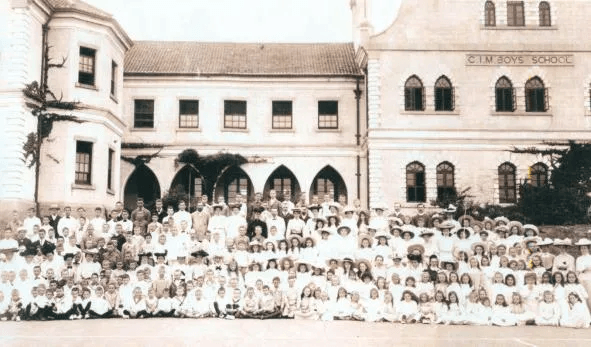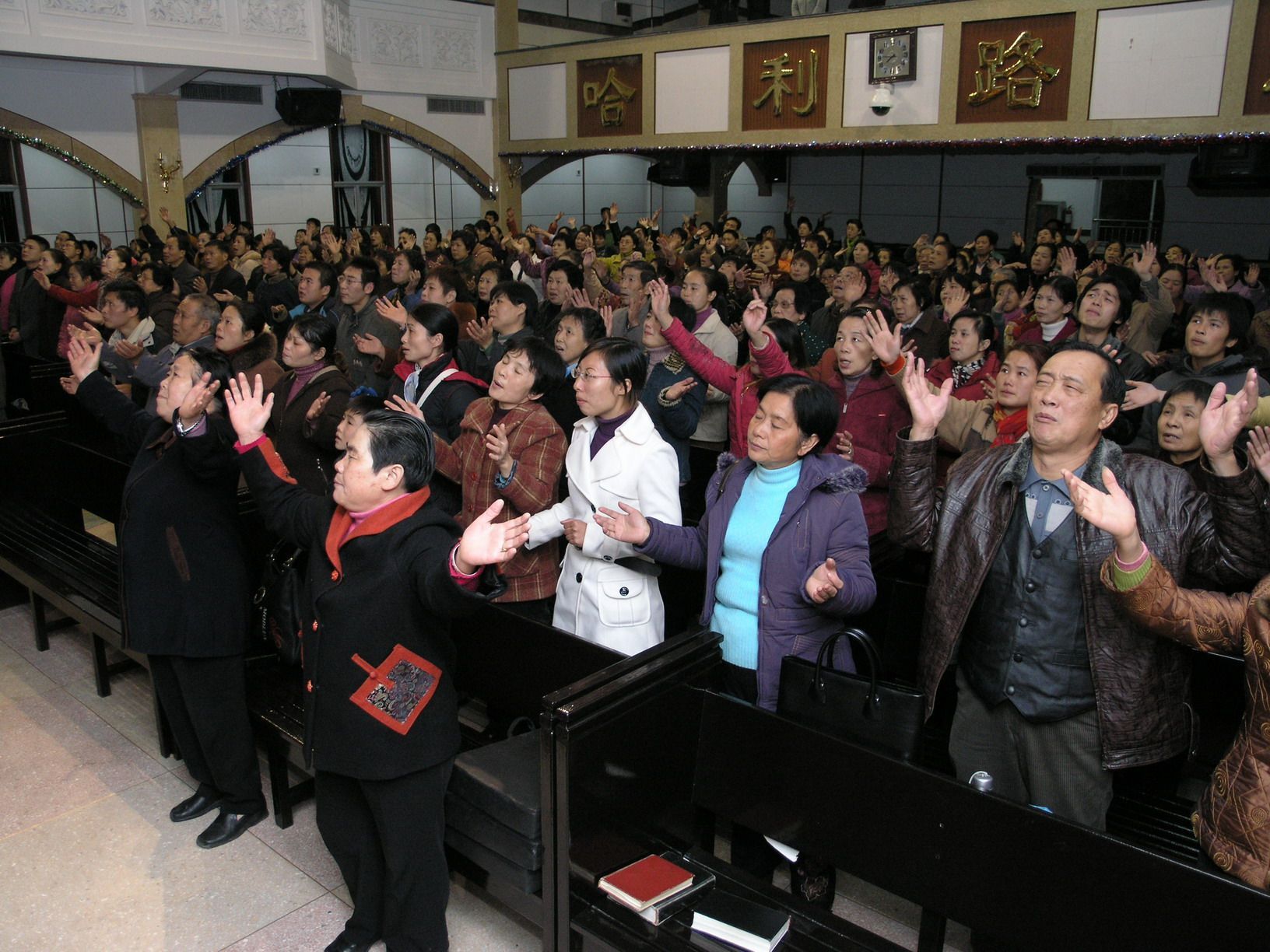1900s

Students and staff at the CIM school in Chefoo (Yantai) in 1913.
The Church in Shandong suffered a setback at the hands of the Boxers, but within a few years it recovered and had grown larger than before 1900. The missionary enterprise in China also expanded, as many Christians around the world volunteered to replace those who had been slain for the gospel.
The opening of the CIM station in Yantai came about in an unexpected manner. Hudson Taylor, the founder of the mission, was ordered by doctors to recuperate in Yantai after a serious illness. The seaside environment and ocean air helped Taylor's recovery, and he asked other missionaries who needed rest to join him there. Almost every instance resulted in a satisfactory change. In due course land was purchased and a mission base was constructed in 1879, containing a hospital and a school which catered for the education needs of hundreds of missionary children over many decades.
The school grew rapidly, proving tremendously beneficial for the overall health of the families in the CIM. Satan, however, threw all he could muster at the school's staff members and students. In 1902, the mission's magazine reported,
"It appears that on Sunday, July 6, all the teachers and students of the boys' school partook of chicken pie at their mid-day meal. To appearances all was satisfactory, and the teachers ate of the same pies in the evening without any bad result. The same evening Gershom Broomhall died at 8:45, after only four hours' sickness. This was attributed to cholera, which is very rife in China at present; but late on Monday poisoning was suspected. No fewer than 19 boys, who had dined together, were taken ill, and of these only six recovered." 1
The Rain Story
In 1908 the sky over Shandong again turned to brass and no rain fell for months. The crops were almost totally ravaged, and the familiar cycle of drought, famine and death began to repeat itself when a group of Christian university students came to Louisa Vaughan and sought her advice.
The entire heathen population of the province had lost hope, and after every town had held processions beseeching the rain god to open up the heavens, the weather had become increasingly hotter and drier. The people took the idol of the rain god and threw it into a field outside Qingdao, hoping it would blister in the intense heat until the spirit granted itself respite by making it rain.
The Christian students' faith was strong enough that they knew not to participate in the idolatrous practices, but they were beginning to waver in their trust in Jesus Christ. They had prayed fervently to Him but still no rain had come. After asking the missionary why their prayers were not being answered and what they should do, Vaughan replied, "There are three hindrances to God answering our prayers: sins of transgression of God's law, sin of non-conformity to His will, and the sin of unbelief." She asked them if they were willing to humble themselves before God and ask the Holy Spirit to expose any sins that were hindering their prayers for rain. "Oh yes!" they replied.
Their knees had scarcely touched the floor when these young men "were sobbing out a confession of their sins before God; sins of unforgiveness, of not trusting Him, of hating fellow students; sins of not witnessing for Jesus in their own families...of lying, cheating and breaking rules." 2
After renouncing their sins they prayed together again and asked God to send the rain. The students told their classmates what had happened, and on the following day 30 people came to the prayer meeting. Again there was much confession of sin followed by an outpouring of the Holy Spirit. On the third day, 75 students crammed into the room, with the same result. On Sunday morning the entire body of 160 students met together for prayer.
All week the students went into the suburbs and villages surrounding the city, telling the people of their prayers and that the True and Living God would soon bring rain. They preached the gospel and many hard hearts softened to the truth.
Finally, after another week or two passed without a drop of rain, the believers awoke one morning to find dark clouds gathered overhead. The heavens burst open and a great deluge saturated the parched Shandong soil. It rained almost non-stop for the next week. The Christians quickly advertised a thanksgiving service, where the entire community was invited to come and give thanks to the Creator for answering the prayers of His children.
The students were so encouraged at having witnessed the hand of God during the ordeal that they organized themselves into 26 small preaching groups and went throughout the countryside proclaiming the Good News of Jesus Christ. The response was overwhelming, with one report saying,
"Citizens from all walks of life flocked to the church. Women hobbled on their poor bound feet for one or two miles in the country round about. Unconverted persons so crowded the church that there was scarcely any space left for the students and the Christians. Overflow meetings were held in classrooms and dormitories.
On the tenth day the chief official with his subordinates and their retinues came to give thanks to God for His deliverance. He said, 'I believe yours is the true God, and that you preach the true gospel." 3
The Woman who Saw Heaven
The Living God performed some remarkable miracles to bless and strengthen His children in Shandong during the first decade of the twentieth century. Louisa Vaughan shared an extraordinary event that occurred at a place named Wangjiaguan in 1904.
After several days' meetings, Vaughan unflatteringly reported, "My audience consisted of the most stupid and ignorant of Chinese women. Some of them were converts, but most came to hear the gospel for the first time. Among them was a Mrs. Zhang, who seemed, if possible, a little more stupid than the rest." 4
After four days of prayer, however, Mrs. Zhang placed her life into the hands of Jesus Christ and became a child of God. Six months later, however, she contracted tuberculosis and suffered intense pain for a year. Her family watched her distress, but were unwilling to listen when she tried to share the gospel. Despite their opposition, Mrs. Zhang maintained a clear testimony and constantly asked God to save her family.
One day it appeared that the disease had almost completed its course and Mrs. Zhang was close to death. Vaughan visited her one last time and hugged her tightly; assuring her they would meet again in heaven. Early the next morning the father of Mrs. Zhang stopped by the missionary's home. Vaughan assumed he had come to break the bad news of her passing, and tried to console him in his grief. "Oh no, no!" he interjected, "The Lord has performed a wonderful miracle. She is alive again!"
The man explained that his daughter had died at three o'clock the previous afternoon and her body was immediately prepared for burial. At sunset they heard a noise coming from inside the death chamber, and thought that children or chickens had broken into the room. When they opened the door they could scarcely believe their eyes. Mrs. Zhang was sitting upright, and had removed her grave clothes and put back on those she had been wearing before her death!
Mrs. Zhang, who had never heard a teaching on the Book of Revelation and could not read her Bible, related what had occurred:
"I remember seeing all the family around me crying. Then the Lord Jesus came into my room and took me by the hand and said, 'Come with me.' In a short time we were before a gate of pearl. It was the gate of heaven. Angels opened it and we went in. I saw many beautiful houses, all of many colors....
Then we went on and I saw thousands of angels in a circle, singing and playing lovely music. In the midst was the throne of glory. The Heavenly Father sat upon it and when I saw Him I was afraid. I hardly dared to lift my eyes....
He said, 'You may go back for a while, but you must return to me here on the twelfth day of next month.'" 5
When news spread of what had happened to Mrs. Zhang, people traveled from miles around to hear her testimony. When she spoke, it came with such spiritual force that nobody could reject it. Hundreds of people were converted. Many years later people in that part of Shandong still eagerly received the gospel because of Mrs. Zhang who they said 'went to heaven and came back again to tell what she saw.'
The days passed until the twelfth of the following month. Mrs. Zhang lay down in her funeral clothes and prepared for her departure, without a single trace of fear or worry. Her relatives tried to convince her that she would not die, but she would hear none of it. At sunset, as her family enjoyed their evening meal, she closed her eyes and her soul returned to be with God forever.
Revival Fires Spread
In 1906, Weixian in north-central Shandong experienced a visitation of God's presence and power. The first signs of the coming blessing were seen during a large conference where 350 women had gathered.
The culmination was reached during the four days in which Dr. Howard Johnston, a Presbyterian minister from New York, visited the station. E.W. Burt of the English Baptist Mission reported,
"He found many of us cold and disheartened; he left us new men—with fresh zeal for our daily tasks, a new spirit of love and forbearance for one another, and an overflowing joy and freedom in prayer such as many had never known....
On Monday the college boys spent from eight o'clock to twelve, and from two to six, and the whole evening, in prayer. I was present most of the time, and to my dying day shall not forget the scene.... At one particular part of the afternoon I remember that some 50 or more short, earnest prayers followed one another in rapid succession for nearly an hour. Some boys got up and said that their original purpose in coming here was to get Western learning and so make money. Now they wanted to live their lives for preaching Christ." 6
The flames of revival spread to other parts of the province. Prayer meetings in Qingdao attracted crowds of 600 zealous believers, who often gathered at 6:30 in the morning and continued their petitions before God's throne until the afternoon. With a spirit of intercession gripping the children of God, a powerful awakening soon broke out, with meetings "marked by confessions, apologies, and reconciliations occurring in the prayer meetings that went on long after midnight." 7
The Holy Spirit began to move powerfully among the Christians of Shandong, cleaning them up first so they could be more powerful witnesses among unbelievers. Missionary T.N. Thompson recalled his experiences when he attended a series of meetings near Qingdao:
"I was impressed with the spiritual fervor of the people among whom I found myself.... The first place where I stopped was the center of a group of 26 villages where there were Christians. At that place a church has been organized with a membership of 200 to start with. In the last three months three new churches have been added in that district, and 54 members have been admitted to the church.... The manifest presence of the Spirit of God in these meetings, seven in all, has been remarkable.
At Daxintan, where there has been a woeful lack of harmony among the Christians and even open quarrelling, the people were greatly moved by the Spirit of God, falling to the floor and crying out to God for mercy because of their sins....
At the next village called Liujiaqao we also held four days of special meetings in a large tent seating about 600 people. It was full at almost every service. Our 'sunrise prayer meetings' were special features of the work. Oftentimes they lasted for three hours or more. One at this place lasted from 6:30 a.m. until 1:00 p.m. without intermission; no one feeling willing to close a meeting which was led by the Spirit Himself. The confessions of sins, prayers for forgiveness and intercessory prayers for their own friends, poured forth by the Christians, showed that they realized how shallow their Christian lives had been, and they were irresistibly led by the Spirit to seek forgiveness." 8
The presence of God was so strong that people often just wanted to cry out for mercy in a bid to gain relief for their internal anguish. At times even the preaching of the Word of God proved impossible. At a meeting in 1906,
"One old woman stood up just as the pastor was about to begin his talk on a certain subject and told him to sit down; she must speak now and confess her sins. And so it went on. There was no way to stop them. One pastor had prepared to speak on four subjects. He never had an opportunity to expound but one. Others fared worse....
This had mostly been a work of grace among the church members themselves. There were many hypocrites and cold ones among them while many were living in open and secret sin. These meetings brought home to them their sins with tremendous conviction.
The work goes on in the countryside. Women have contributed hundreds of finger rings, bracelets, large hair-pins, earrings, and other ornaments of silver, giving them to the native pastors and asking them to open schools in the country where they might learn of this new doctrine which cares for women and teaches them to read." 9
© This article is an extract from Paul Hattaway's book 'Shandong: The Revival Province'. You can order this or any of The China Chronicles books and e-books from our online bookstore.
1. China's Millions (September 1902), p. 124.
2. Vaughan, Answered or Unanswered, pp. 49-50.
3. Vaughan, Answered or Unanswered, pp. 54-5.
4. Vaughan, Answered or Unanswered, p. 42.
5. Vaughan, Answered or Unanswered, p. 45.
6. "The Blessing at Weihsien," China's Millions (January 1909), p. 6.
7. J. Edwin Orr, Evangelical Awakenings in Eastern Asia (Minneapolis, MN: Bethany House Publishers, 1975), p. 35.
8. T.N. Thompson, "Shantung," Chinese Recorder and Missionary Journal (June 1906), pp. 348-9.
9. T.N. Thompson, "The Revival Still Continued," Chinese Recorder and Missionary Journal (November 1906), pp. 646-7.





